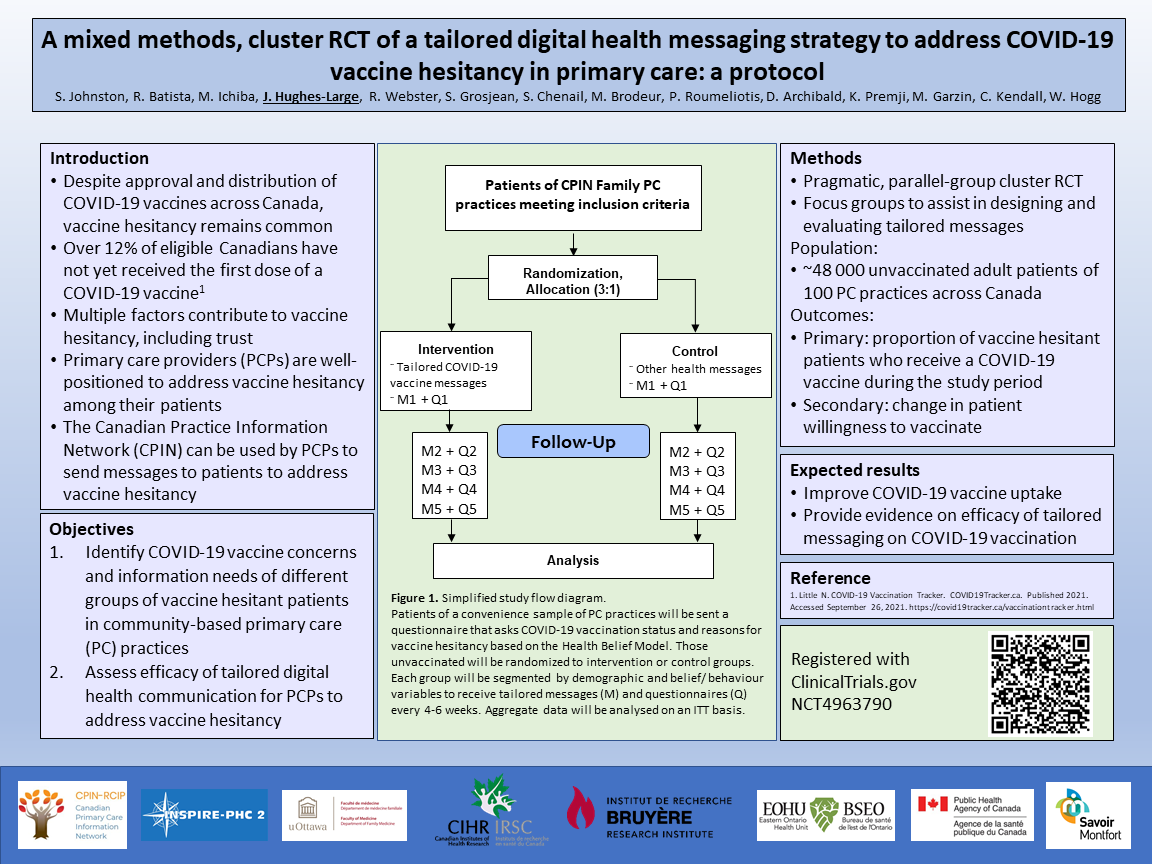PRP002: A cluster RCT of a tailored digital health messaging strategy to address COVID-19 vaccine hesitancy in primary care
Jennifer Hughes-Large, MD, MSc; Maryame Ichiba; sylvie Grosjean; Sharon Johnston, MD, LLM; Ricardo Batista, MD, PhD, MSc; WILLIAM E HOGG, MD; stephanie chenail, BSc, MPH
Abstract
Context: Vaccine hesitancy threatens the effectiveness of a key countermeasure in the COVID-19 pandemic: vaccination against SARS-CoV-2. COVID-19 vaccine hesitancy is estimated at 20% among Canada’s population. Primary care providers (PCPs) are well positioned to address COVID-19 vaccine hesitancy among their patients, as trusted sources of healthcare information.
Objectives:
1. To identify COVID-19 vaccine concerns and information needs of different groups of vaccine hesitant patients in community based primary care (PC) practices
2. To develop tailored digital health communication for PCPs to address vaccine hesitancy in their patients
Study Design: Mixed methods, single-blind, cluster randomized controlled trial
Setting: Community-dwelling adult patients of 10 PC practices in Ontario, New Brunswick, and British Columbia, approximately 24 000 patients in total
Population: Inclusion criteria: patients aged 18+ in a participating PC practice, who speak English or French, who are unvaccinated for COVID-19. Exclusion criteria: patients not meeting inclusion criteria, or unable to participate for any reason.
Intervention: The Canadian Primary Care Information Network (CPIN) is a system that allows PCPs to send messages and surveys to patients. Through CPIN, an initial questionnaire assessing COVID-19 vaccine intention and reasons for vaccine hesitancy will be sent to all patients. Vaccine hesitant patients will be randomized 3:1 to receive either the intervention of tailored messages for COVID-19 vaccination, or unrelated control health messages. Patients allocated to the intervention arm will be further segmented into up to 10 segments based on sociodemographic and vaccination attitude variables. Messages will be designed to meet the needs of each segment. Every 4-6 weeks, a message and survey reassessing COVID-19 vaccine hesitancy and message utility will be sent to each group, to a total of 5 messages.
Focus groups using a User Centered Design approach will be conducted following the initial survey and at the end of the study period to test and improve our tailored communication strategy.
Outcome measures: Primary: change in patient willingness to vaccinate. Secondary: proportion of vaccine hesitant patients who receive a COVID-19 vaccine during the study period.
We anticipate that our tailored digital health communication strategy will improve COVID-19 vaccine uptake among PC patients and assist PCPs in addressing vaccine hesitancy among their patients.
Objectives:
1. To identify COVID-19 vaccine concerns and information needs of different groups of vaccine hesitant patients in community based primary care (PC) practices
2. To develop tailored digital health communication for PCPs to address vaccine hesitancy in their patients
Study Design: Mixed methods, single-blind, cluster randomized controlled trial
Setting: Community-dwelling adult patients of 10 PC practices in Ontario, New Brunswick, and British Columbia, approximately 24 000 patients in total
Population: Inclusion criteria: patients aged 18+ in a participating PC practice, who speak English or French, who are unvaccinated for COVID-19. Exclusion criteria: patients not meeting inclusion criteria, or unable to participate for any reason.
Intervention: The Canadian Primary Care Information Network (CPIN) is a system that allows PCPs to send messages and surveys to patients. Through CPIN, an initial questionnaire assessing COVID-19 vaccine intention and reasons for vaccine hesitancy will be sent to all patients. Vaccine hesitant patients will be randomized 3:1 to receive either the intervention of tailored messages for COVID-19 vaccination, or unrelated control health messages. Patients allocated to the intervention arm will be further segmented into up to 10 segments based on sociodemographic and vaccination attitude variables. Messages will be designed to meet the needs of each segment. Every 4-6 weeks, a message and survey reassessing COVID-19 vaccine hesitancy and message utility will be sent to each group, to a total of 5 messages.
Focus groups using a User Centered Design approach will be conducted following the initial survey and at the end of the study period to test and improve our tailored communication strategy.
Outcome measures: Primary: change in patient willingness to vaccinate. Secondary: proportion of vaccine hesitant patients who receive a COVID-19 vaccine during the study period.
We anticipate that our tailored digital health communication strategy will improve COVID-19 vaccine uptake among PC patients and assist PCPs in addressing vaccine hesitancy among their patients.

Jack Westfall
jwestfall@aafp.org 11/21/2021Terrific poster and presentation. Thanks for your work.